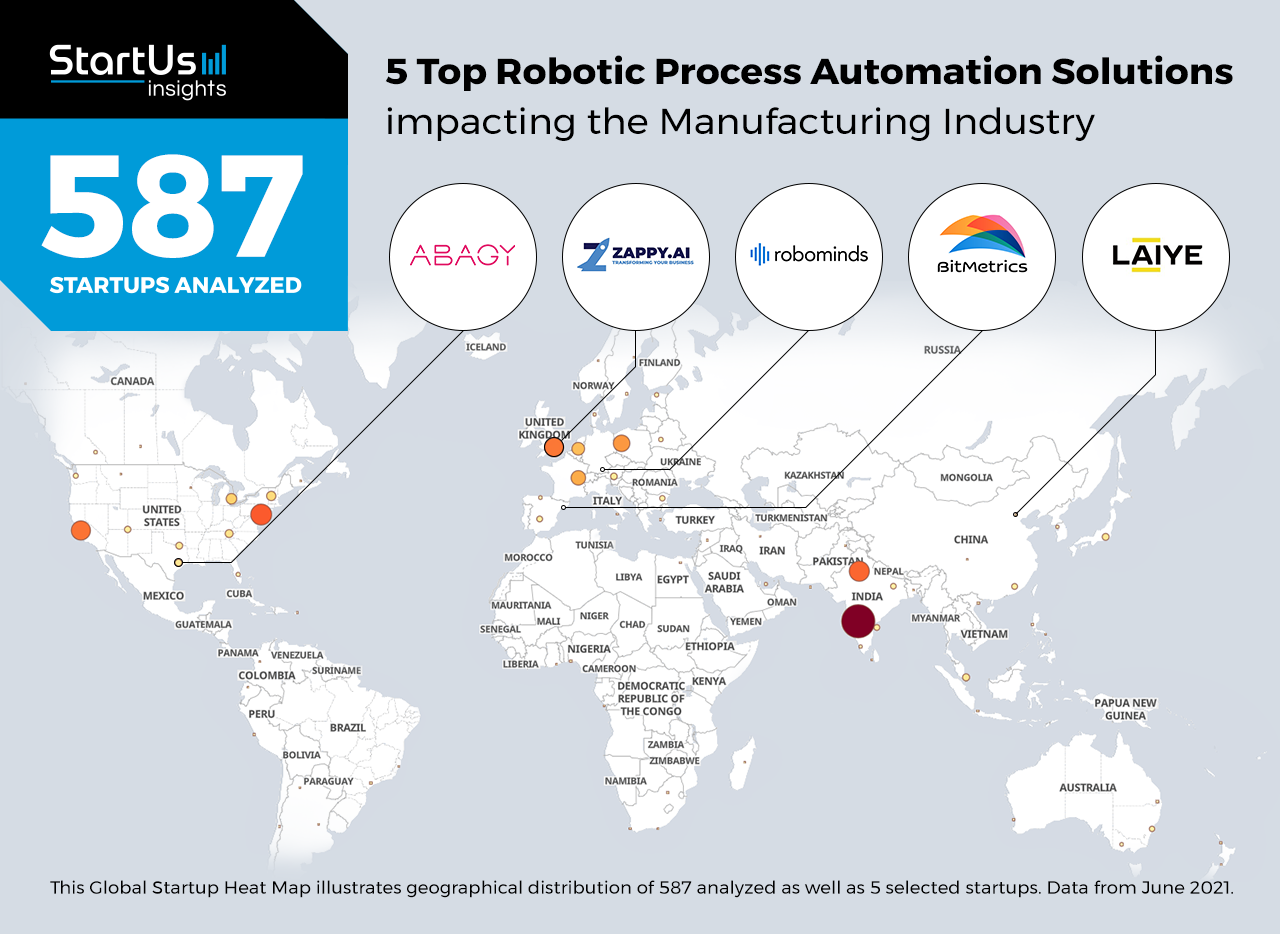Staying ahead of the technology curve means strengthening your competitive advantage. That is why we give you data-driven innovation insights into the manufacturing sector. This time, you get to discover 5 hand-picked robotic process automation startups.
Global Startup Heat Map highlights 5 Top Robotic Process Automation Startups impacting Manufacturing out of 587
The insights of this data-driven analysis are derived from the Big Data & Artificial Intelligence-powered StartUs Insights Discovery Platform, covering 2.093.000+ startups & scaleups globally. The platform gives you an exhaustive overview of emerging technologies & relevant startups within a specific field in just a few clicks.
The Global Startup Heat Map below reveals the distribution of the 587 exemplary startups & scaleups we analyzed for this research. Further, it highlights 5 robotic process automation startups that we hand-picked based on criteria such as founding year, location, funding raised, and more. You get to explore the solutions of these 5 startups & scaleups in this report. For insights on the other 582 robotic process automation solutions for manufacturing, get in touch.
Bitmetrics automates Industrial Manufacturing Processes
Robotic process automation in the manufacturing industry optimizes tasks such as material transfer, machine loading, and product packaging. Robots generally perform singular functions and do not adapt easily to other tasks. However, computer vision and perception tools allow robots to learn new tasks. This is why startups are developing machine vision solutions to make robots multi-functional.
Spanish startup BitMetrics provides automation of industrial manufacturing processes. It leverages machine vision, artificial intelligence (AI), and robotics to drive end-to-end automation. The system uses cameras, optic sensors, and software to automate task execution via robots. The solution is integrable with existing systems like local, edge, and cloud platforms. The startup also provides an application platform to visualize and control the processes measured against its key performance indicators (KPIs).
Abagy provides Robotic Welding System
The welding industry currently faces problems of inflexibility in welding designs. The task is more difficult for the design of more complex structures. There is a requirement for flexible systems to accommodate variance production. Therefore, startups are developing software solutions to make welding systems more adaptable.
US-based startup Abagy provides a robotic welding software system for manufacturing. The startup’s solution enables conveyor line system implementation for non-serial, high variance production. The software also offers various configurations and welding parameters. It facilitates welding sequence control through simulations to calculate production cycle time. It measures the robot’s movement while in use, making the system adaptable to environmental changes, deviated parts, and deformations during the execution.
Laiye provides Data Collection Automation
The collection of retail data, performance reports, and product information manually are time-consuming. This is particularly difficult in the manufacturing sector as sources of data collection are vast and the complexity increases further as manufacturers integrate new technologies within current frameworks. Moreover, ascertaining the accuracy of the data collected is equally challenging as there are possibilities of errors. Therefore, to optimize data collection and processing in the manufacturing industry, startups are developing RPA tools.
Chinese startup Laiye provides AI-integrated RPA software. The startup’s solution, Laiye RPA Mage, provides native AI capabilities that seamlessly merge with RPA robots. The solution integrates with Laiye RPA Creator, a web-based RPA software, enabling minimal code development. The startup combines RPA and AI to process complex unstructured data from the production department, retail department, and more. The solution automates data extraction through data collection and stores them in specified files. The startup’s solutions streamline operations, increase manufacturing efficiency, and improve worker efficiency.
Robominds offers Multi-Robot Control System
Modulating robots and programming the functionalities is time-consuming and prone to errors. In manufacturing, often more than one robot is deployed at a workstation in collaboration with human beings. The programming of these robots becomes more complex as multi-robot work synchronization is required. Therefore, startups are developing systems for multi-robot control and human-robot collaboration.
German startup Robominds provides a robot control system. The startup’s robobrain.control solution is a Programmable Logic Controller (PLC) that allows simultaneous control of several robots at one station. It also facilitates human-robot collaboration. The solution enables combining individual instructions to form tasks and then position them in the flow chart through a drag & drop feature. This further simplifies RPA in manufacturing plants since process workflow scheduling becomes easier. Moreover, workers update the workflow anytime according to their project requirements.
ZappyAI offers an Automation Discovery Platform
Minimizing the turnaround time in manufacturing is challenging as the volume of statements received by the manufacturing hub is large. These include reports from the production plant with product volumes and other details that need prompt processing on SAP by the production analyst. Errors or delays in processing the data lead to incorrect accounting and financial loss. Thus, startups are developing robotic process automation tools to automate template-driven tasks.
British startup ZappyAI enables the automation of template-driven, repetitive tasks. The startup’s solution, the Zap Automation AI, automates processes by deploying machine learning (ML) models. The platform observes employee behavior on work computers and then identifies repetitive tasks to automate. The solution also analyzes and interprets different manufacturing-related data including order fulfillment, data entry for accounts payable and receivable, inventory reports, and purchases data. After interpretation, it triggers responses and communicates them with other systems such as SAP.
Discover more Manufacturing startups
Manufacturing startups such as the examples highlighted in this report focus on RPA for industrial processes, as well as automation discovery and advanced analytics solutions. While all of these technologies play a major role in advancing smart manufacturing, they only represent the tip of the iceberg. To explore more RPA technologies, simply get in touch to let us look into your areas of interest. For a more general overview, you can download our free Manufacturing Innovation Report to save your time and improve strategic decision-making.







